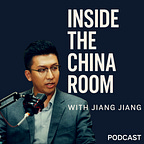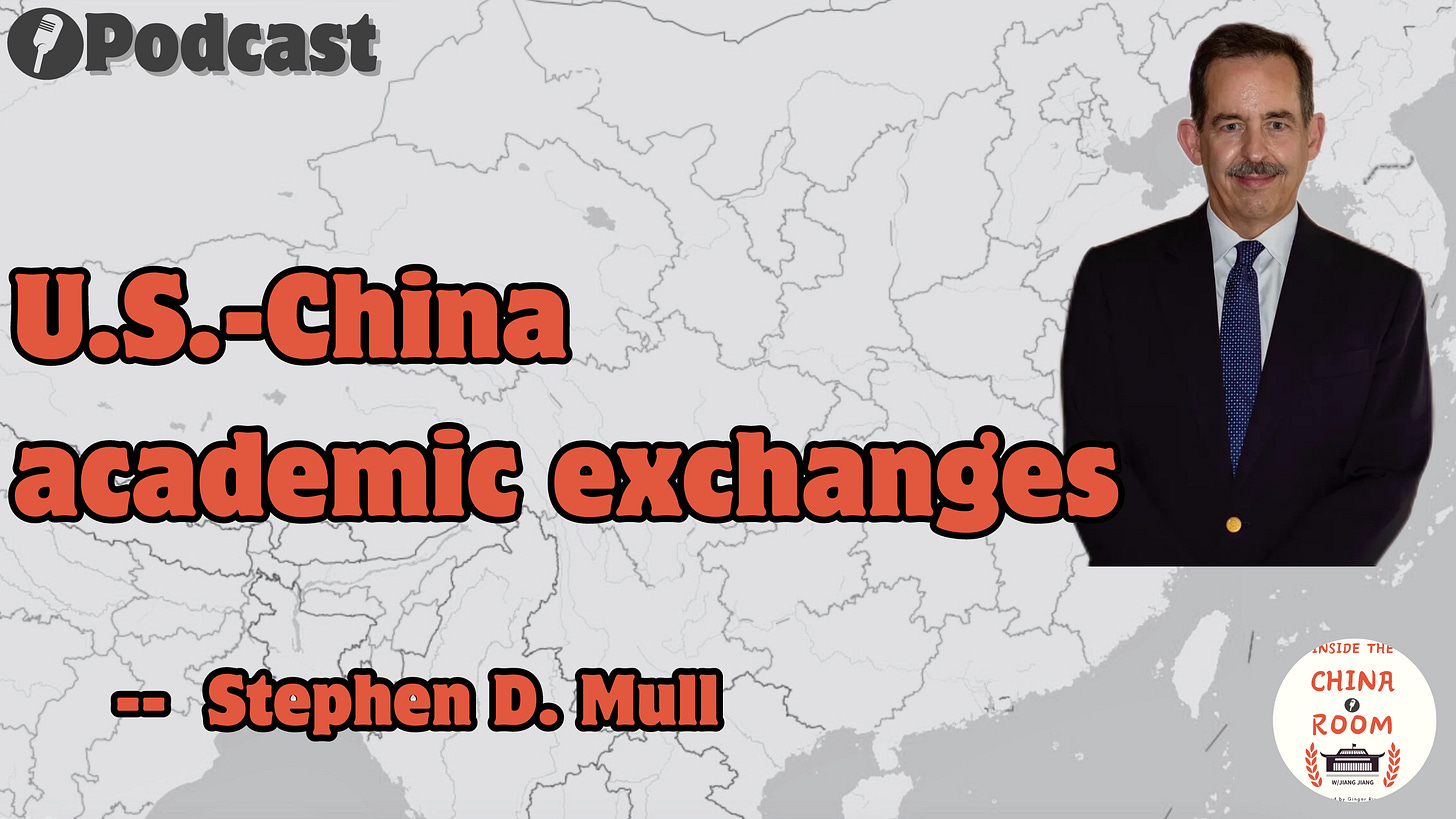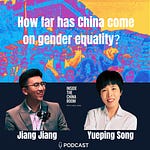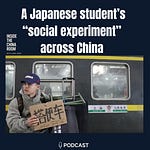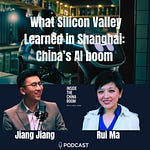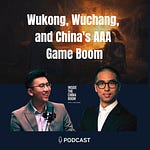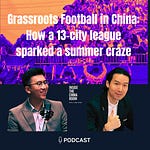This week on Ginger River Radio, Jiang Jiang welcomes Stephen D. Mull, who is Vice Provost for Global Affairs at the University of Virginia (UVA) and has served in a broad range of U.S. national security positions, most recently as Acting Under Secretary for Political Affairs at the U.S. Department of State.
Mull introduces the members and business objectives of the delegation of the UVA to Shanghai and shares his insights into the importance of people-to-people exchanges between the U.S. and China in the post-pandemic era, the academic realm’s even larger obligation of communication during challenging U.S.-China relations, and UVA’s very own pingpong diplomacy.
Summary:
The University of Virginia (UVA) is eager to welcome back Chinese students as China moves on from COVID. The UVA delegation to Shanghai and Beijing will reconnect with the UVA alumni, engage with Chinese partners, and open up channels for Chinese students to study in the U.S. and for U.S. students to come to study in China.
The academic realm has an even larger obligation of communication with Sino-U.S. relations heading downwards. Whatever political and military disagreements there are between the two countries, higher education institutions should not give up on common challenges of mankind, such as climate change and global health.
The UVA has been and will be an active partaker of U.S.-China people-to-people exchanges. The UVA table tennis club is likely to have a ping pong tour in China as a gesture of goodwill and communication.
You can also listen to Ginger River Radio on Apple Podcasts and Spotify.
Stephen D. Mull, Vice Provost for Global Affairs at the University of Virginia
Highlights:
04:39 - The members and business objectives of the delegation of the UVA to Shanghai
08:41 - The UVA is eager to welcome back Chinese students and undertake people-to-people exchanges
13:58 - The UVA's very own pingpong diplomacy
17:54 - The importance of U.S.-China academic cooperation in climate change and global health.
Recommendations:
Latest album by Bruce Springsteen, Letter to You
Movies by Chloé Zhao, Nomadland and The Rider
A complete transcript of this podcast is available here:
JJ: Welcome to the Ginger River Radio podcast, a part of the GRR media outlet and your go-to podcast for anything about Chinese current events. I'm your host, Jiang Jiang, the founder of Ginger River Review (GRR), a newsletter that focuses on reporting the priorities of both the leadership and the general public in China and views you do not normally see from mainstream English language media. If you haven't subscribed to our newsletter, go to www.gingerriver.com and sign up to join our community of avid China-watchers. Now let's dive into our podcast show today.
JJ: For over a decade, China has held the distinction of being the top country of origin for international students in the U.S., contributing significantly to the revenue of numerous American universities and colleges. Last year, the U.S. hosted approximately 290,000 Chinese students, maintaining the largest representation in the international student population. However, according to the Institute of International Education (IIE), this number marked an 8.6 percent decline from the previous year. In contrast, the influx of Indian students saw considerable growth, nearing 200,000 last year - a notable 19 percent increase from the year prior.
As COVID-19 is no longer an international public health emergency, and offline civilian exchanges between China and the United States gradually increase after China optimized its epidemic response, are American universities still enthusiastic about accepting Chinese students?
Join me to talk about the importance of educational and people-to-people exchanges between U.S. and China in the post-pandemic era today is Stephen D. Mull, who is Vice Provost for Global Affairs at the University of Virginia. The University of Virginia's delegation led by Mull will visit China from May 30 to June 1 to assess prospects for further development of the University's academic engagement in China, following a hiatus during the COVID pandemic outbreak in 2020. This podcast episode is recorded on May 30, the first day of Mull’s visit to China, in Shanghai.
Mull has served in a broad range of U.S. national security positions, most recently as Acting Under Secretary for Political Affairs at the U.S. Department of State, working as the day‐to‐day manager of overall regional and bilateral policy issues, and overseeing the bureaus for Africa, East Asia and the Pacific, Europe and Eurasia, the Near East, South and Central Asia, the Western Hemisphere, and International Organizations. Mull was the U.S. Ambassador to the Republic of Poland from 2012 until 2015 and U.S. A mbassador to the Republic of Lithuania from 2003 to 2006.
Hi, Ambassador Mull, welcome to Ginger River Radio!
Mull: Thanks for having me. It's great to be with you.
JJ: Could you introduce the main members of your delegation on this trip to China and what are the primary objectives of your visit? I know you have a very intense schedule. What are the main events planned for your itinerary in China, and who are you hoping to meet most during your stay in China?
Mull: The reason I’m here is China is by far our most important foreign partner for our international students and our international engagement. We have almost a thousand Chinese students attending the University of Virginia from the undergraduate up through the graduate and professional level. And our office here in Shanghai is the only international office that the university has in the world for now.
So it was time to come. We have had to reduce a lot of our engagement here because of COVID like every other country around the world. And so I'm very eager to get back to work in China and getting our engagement going again with our Chinese partners. And we also want, you're one of them, we have quite a big alumni community here throughout the country, and I'm really eager to meet with them to meet with the parents of our students.
Our delegation is, first of all, Justin O’Jack, our office director here in Shanghai, who will be spending the whole visit with me. And we also have a few colleagues from the University Office of Engagement and Advancement, which develops relations with our alumni community and the friends of the university, including a Chinese recent graduate of UVA who's going to be going back to McIntire School of Commerce later this fall. He's here with us as well. And so it's actually great having somebody from China to be part of our delegation.
While we're here, we're going to be meeting with our alumni here in Shanghai and in Beijing. We're also going to be meeting education officials here in Shanghai. I also want to meet my old colleagues from the State Department who work at the consulate general here in Shanghai, and I'll be meeting officials at the embassy in Beijing.
And the principal goal of all of this is to reintroduce the university to our community here and our friends here, and to make an assessment about how we can best start people-to-people and academic exchanges here in China now that we're fortunately moving beyond COVID.
JJ: It's great to see that you and the university attach great importance to the Chinese students and the Chinese community. We know that the past three years have seen some impact on the exchanges between Chinese and American universities due to the pandemic and other factors. I am wondering whether you might have recently engaged in any exchanges with Chinese students from the University of Virginia (UVA)? What are your thoughts and feelings from these interactions?
Mull: I interact with our Chinese student community quite often. As I mentioned earlier, we have almost 1,000 Chinese students at the university. And I have many interactions with them. The leadership, we have a Student Council at the university, and there's a special section of the Student Council that is for international students. And there have been Chinese students regularly serving in that capacity.
So my sense is, I know we're happy to have them there. They seem very happy to be there as well. It was a tough, difficult time for them during the pandemic. They weren't able to go back home to be with their families, in some cases for many years. But I think they're relieved, I know I'm relieved, that we're coming out of that and getting back to a more normal state of affairs.
JJ: Yeah, I'm sure the past three years have been tough for some Chinese students who want to study in America and for some American students who want to study in China. In the last episode of this podcast, Dr. Henry Huiyao Wang, the Founder and President of the Center for China and Globalization (CCG), a leading non-governmental think tank in Beijing, said that Chinese student was still very much wanted in the United States despite all the noises according to his recent visit to the U.S. Do you feel the same?
As the Vice Provost for Global Affairs at UVA, and considering that your delegation is the first high-level one from the university to China since before the COVID pandemic began, what message would you like to deliver to Chinese prospective students?
Mull: I would say just this: we are open for business and we are really eager to continue to have such a great representation from China, for students to come from China to study at UVA. I think our Chinese student community has generally been very, very successful. Their grade point average tends to be actually, on average, higher than American students. And it's just a good sign of how successful they are. So we're eager to continue to attract as many students from China as we can. And we're eager to send American students here.
As you know, it's not a secret that the political relationship between the United States and China is not the best right now, but during times like that, I think people-to-people exchanges, I think higher education has an even more important role to play to keep channels open between our countries and between our societies.
China and the United States are the biggest power players on the world scene today. And so our security is so dependent on how we interact with each other. So it's really important that if diplomats aren't communicating very well, the politicians aren’t communicating very well, that means we have an obligation in higher education to keep those channels of communication open. And so, I really want to make sure that no matter how bad the political relationship may be, that we can still work on the things that we have in common in higher education and learn from each other.
JJ: Yeah. And can you tell us more about the partnerships and the University of Virginia currently have with the Chinese universities and other institutions? And given some of the challenges in the Sino-U.S. relations you just mentioned, how do you view the significance of exchanges between universities, between the academic areas of the two countries in fostering the people-to-people interactions between the two countries? Actually, I personally feel that UVA is relatively active in promoting people-to-people exchanges between the two countries. What drives you and UVA to promote all those activities?
Mull: I think we have a number of long-standing partnerships here that Justin, our office director has played such an important role in developing and maintaining even as students left because of COVID and the travel restrictions. So these agreements have not been very active, but they are still in force. So I think we have a good network of universities here in China around the country that as people start coming back, are able to come back to China, that will have a good network to plug into. And so we want to revive those relationships.
I think speaking in terms of what I'm responsible for at the University of Virginia in developing opportunities for students to have international education experiences, it's clear to me that if you go to university and you don't have an opportunity to learn a foreign language, live in a culture different from your own, see the world through somebody else's eyes, and get a different perspective on the problems that all of us as human beings face, whether it's mitigating the impact of climate change, dealing with economic imbalances and trade issues, all of those to solve those problems together require us to have not only a good idea of how we see the world, but how other people see the world. Because only then can you begin to identify a common path forward to solve these problems that we have to solve as human beings.
So I think it's THE most important thing I have to do working at a university is to push as many of our students overseas as possible, and in exchange, welcome as many students from overseas to us in Charlottesville as we can.
JJ: Yeah, you mentioned about Charlottesville. It really reminds me of the two years’ experience in Darden School of Business, which also enjoyed lots of fruitful life in Charlottesville. And I heard that UVA has a plan of sending its student table tennis club to China to have a ping-pong tour in 2024. That sounds like a very cool idea. It reminds me of the pingpong diplomacy between China and U.S. in 1971. Could you tell us more about how the idea came out and how do you expect about the tour?
Mull: One of my earliest memories of China, when I was quite young in grade school and middle school in the United States, I didn't really know much about China except people called it "Red China". It was a mysterious place, very hostile to the United States. And then in the early 1970s, there was this so-called ping pong diplomacy, which ended up opening the doors to Richard Nixon's visit here, and then later the Carter administration’s establishment of regular normal diplomatic relations between the United States and China. So my very first memory that we can maybe learn more about China came through this ping pong diplomacy that you mentioned in the early 70s.
Now, more than 50 years later, Justin, our office director, participated in his own ping pong diplomacy here with the Shanghai municipal authorities. And the Organization for the Promotion of Friendship between Shanghai and the Foreign Community organized a ping pong tournament to commemorate the anniversary of this ping pong diplomacy. And Justin performed very well in it.
As we were talking about it, he said, maybe we should explore having our UVA ping pong club here. We have a ping pong club at UVA. They're very popular. They have quite a good record. I think they will compete very well here. So I think it would be a great experience for our students to come here and play ping pong with Chinese counterparts and learn about Chinese culture, learn about the history of ping pong diplomacy, and learn a lot more about China.
So during our time here in Shanghai, I'm going to look at exploring whether the Shanghai, our partners in Shanghai might be willing to work with us to organize a visit like that. And maybe as soon as January of this year, so I know our students are very excited about the prospect. I am too, I would like to come, I'm not a very good ping pong player myself, but I would like to, with them, come back next winter to cheer them on. And I think it would be a really positive thing for our university and for our relations here in China.
JJ: I'm also looking forward to that. As a UVA Darden graduate, I know that there are many alumni of UVA including the Darden School of Business working in different industries in China. In terms of industry distribution, did you find any interesting or worth highlighting about the alumni's working domain in China?
Mull: I'm hoping to find out more, I'm not up to date on that. We're going to be spending time. We have a few hundred people coming to a reception. I hope you'll be there tomorrow night and I'm looking forward to getting caught up to find out how our graduates are doing, what sort of industries they're working in, how their professional lives are going.
As you probably know, UVA we'd like to think of our alumni as a family that we never lose contact with. So I'm looking forward to getting caught up with them tomorrow.
JJ: Before we move to the recommendation section, the last question is that we know that there are some challenges in terms of the relationship between the U.S. and China. What areas do you think the U.S. and Chinese universities should have more cooperation and exchanges in the coming years? What are the biggest challenges the two sides face currently in terms of the academic exchanges now?
Mull: So I think it's best to start when you have two countries that have political disagreements as the United States and China do on all sorts of things, whether it's the military questions or political questions, diplomatic questions. One of the current tensions in the relationship is what's the proper response to the Russian invasion of Ukraine? So let the diplomats sort about that. I think in the academic realm, let's look at the problems that we face in common as human beings. And I think here, most principally of the threats that all of us face from climate change. Climate change is a fact. It's caused by human activity. Certainly, a big part of it is caused by human activity.
So we, as human beings have a common responsibility to find a way to mitigate the impact of that climate change. And this is something that affects all of our security, regardless of what you think about the war in other parts of the world or what you think about Taiwan or other issues. All of us face, whether you're Chinese or American or from Bhutan, we all face that challenge.
So I think as researchers and as academicians, we have an obligation to work together to find common solutions to the problem of that global health. Fighting against there ... there's going to be another pandemic, eventually. China has learned a lot from dealing with COVID. We have learned a lot. We've certainly made mistakes in the United States that we need to learn from, and we need to share our mistakes and what we've learned with partners like China. So I think that's another area in which the United States and Chinese higher education communities can and should be cooperating together.
So I very much hope that as we restart our academic engagement that we're able to send students here to look into things like that, to send our researchers here, and to welcome researchers from China in the United States.
JJ: Thank you. We invite every guest of our podcast to recommend something to our listeners. It can be a book, a movie, a TV series, a podcast, or even a video game. Do you have anything to recommend for us today?
Mull: I can always recommend lots of things.
So on the music side I am a huge fan of Bruce Springsteen. He's a musician I have followed and been a very strong fan of my whole life. I don't know how familiar your Chinese audience is with the Bruce Springsteen, but I would certainly recommend his latest album called Letter to You. It's definitely worth a listen, a really good rock & roll record.
On the movie side, I am a huge fan of the work of Chloe Zhao, a Chinese American filmmaker. I understand maybe her works aren't accessible here in China. One of her movies, Nomadland, won the Academy Award a couple of years ago. But my favorite, favorite movie of the last 20 years probably is an earlier work of hers, called The Rider, about a young Native American man who has dreams of being a rodeo star. I won't spoil the movie, but it's just one of the most beautiful movies I've seen in my life about how you have dreams, how people have dreams. And you can't always realize your dream, and that's a tragedy. But sometimes, without even knowing it, you fulfill the dreams of others that people have in you. And it's a beautiful film that if you can see it and your audience can see it, I'd strongly recommend it.
JJ: Thank you. That's great recommendations. I have watched Nomadland. But The Rider one, I haven't watched that.
Mull: It's an early movie. It's a beautiful film.
JJ: Let me check that out and also the music. Thank you very much. I know that this is a very intense schedule for you and thank you very much for taking time to have this podcast talk with us. I hope you have a smooth and productive trip in China this time. Hope you enjoy the night of Shanghai and the day in Shanghai and Beijing.
Mull: Such a pleasure. Thank you again for the invitation. I'm so excited to be back here in Shanghai. I'm away for almost four years. Thank you. It's great to be back.
JJ: Thank you.
JJ: The Ginger River Radio podcast is a part of the GRR media outlet. Our show is produced and edited by me, Jiang Jiang, Yu Liaojie from Shanghai International Studies University, and Jia Yuxuan from Beijing Foreign Studies University. For cooperation, investing or feedback, email me directly at jiangjiang@gingerriver.com, or just give us a rating and a review on Apple Podcasts. We would be delighted if you would recommend our podcast or newsletter to others if you find it helpful. Thank you for listening and see you next time. Take care.

